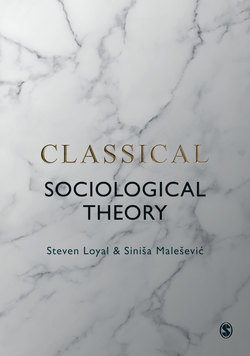Читать книгу Classical Sociological Theory - Sinisa Malesevic - Страница 17
На сайте Литреса книга снята с продажи.
The Restrictions of Citizenship in Greece
ОглавлениеBy the time of Pericles (495–25 bce) the full power of the polis derived from the people, specifically male citizens, the demos, rooted in the Assembly. Greek democracy entailed each male having one vote. The basic principle underlying political leadership was that no one was better qualified than anyone else – by breeding, intellect or training – to direct public policy. The Assembly met regularly, usually four times a month but more in times of emergency, in the open air on the hill known as the Pnyx. During Pericles’ time, perhaps nearly every 10 days. Although initially a full-time bureaucracy did not exist, with much administrative work done on a voluntary basis, as the number of offices increased in public affairs it required the attention of about one-third of the citizenry: 500 boule, 6000 heliastai (jury members) sitting in people’s courts known as dicastries, 500 wardens of the arsenal and around 10,000 citizens who performed a host of other duties. Pericles initiated payment for carrying out these administrative political duties, for example paying citizens 1 obol a day for service on juries.
In such a context ordinary citizens did not think of the state abstractly as a distinct generic establishment standing over them, but rather as a community of male citizens. Nor were there any hard and fast distinctions between state and society or public and private. Somewhat paradoxically, as Anderson notes ‘Athens, which had known the most untrammeled democracy of the Ancient World, produced no important theorists or defenders of it’ (1978: 73).
Shifts in the social structure of Athens and policies designed to reduce class tensions led to a reconfiguration rather than disappearance of class conflicts within the Athenian polis and between it and other poloi. The conflict between the rich and poor over taxation rested on the demos’s political power in the Assembly. This in turn led the rich to oppose democracy and aim to supplant it with an oligarchy – rule by a small number of rich individuals. Economic pressures and status tensions were exacerbated by wars, especially the Peloponnesian War with Sparta. It has been argued that the Greek class system was conducive to war and that the demos was more inclined to military adventures and war since these provided much of the state’s surplus from which it derived its direct economic support (Gouldner, 1967). Through war the upper classes found themselves economically drained and politically damaged, yet they needed war as a way of diverting the demos from taxing them further. Warfare was a fact of everyday life for the ancient Greeks. During the century and a half from the Persian Wars (490 and 480–79 bce) to the Battle of Chaeronea (338 bce) Athens was at war, on average, more than two years out of three, and never enjoyed a period of peace for over ten consecutive years (Garlan, 1976: 15).
In addition to the warrior code and martial values, various commentators have tried to identify other values important to Greek culture (Adkins and Adkins, 1998; Gouldner, 1967; MacIntyre, 1998). These include the disposition to punish one’s enemies and reward one’s friends; high levels of competition, which also affected interpersonal relations; a need for friends but also a crisis in intimacy (Gouldner, 1967); and envy as a normalised emotion. Greeks were also attracted to the body, to its health, its youth, its beauty, and physical prowess was associated with all-round virtue. They also foregrounded and placed great emphasis on the notion of immortality.
